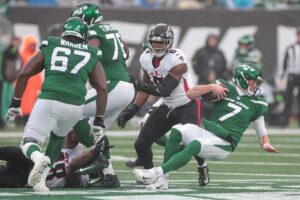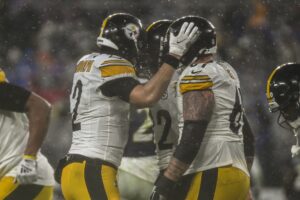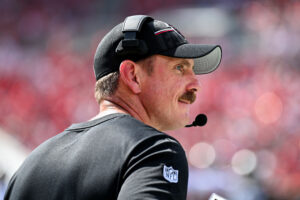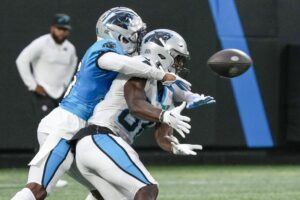We hear the expression over and over, football is like a chess match. NFL head coaches have the same amount of pieces available but how they utilize them is strictly up to the individual. Super Bowl LIII was a highly anticipated matchup largely in part to the two head coaches – Sean McVay of the Los Angeles Rams and Bill Belichick of the New England Patriots. Despite the latter having many more years of coaching experience, both coaches are regarded as two of the best football minds in the league right now.
Come Super Bowl Sunday, however, the unthinkable happened. The Rams were unable to get anything going on offense and looked disoriented, losing the game 13-3. The high-flying offensive system that McVay had created had been completely shut down as the Rams scored the fewest points ever during the McVay-era. How did this happen? Well, the defensive genius of Belichick came with a gameplan unlike any other and his defense executed it to perfection on Super Bowl Sunday.
Bill Belichick Outcoaches Sean McVay on the Way to Super Bowl LIII Victory
Attacking Vertically
A big part of the Rams offensive gameplan is establishing the run and how they do that varies but it starts with the wide zone run play. Whether it’s with Todd Gurley or C.J. Anderson, the Rams have had tons of success running this play throughout the 2018 season.
Rams “Wanda” examples. Wide Zone away from the Y. pic.twitter.com/OqgLsEcLDh
— James Light (@JamesALight) February 2, 2019
As seen here, the Rams running backs have great vision knowing when to cut back inside or stay true to the play and follow the blockers. Defending this run play can be difficult because while the defensive line can maintain their gaps and run laterally with the offensive line, that still leaves the cut back lanes vulnerable.
The best way to stop a wide zone is to have your defensive line penetrate vertically up the field, causing havoc in the backfield and the New England defense did just that. While they may not have made every tackle for loss, the disruption alone slows down the running back which ultimately results in fewer yards. The Rams ran the wide zone three times in the first half with Gurley and gained only 10 yards. Here, color commentator Tony Romo breaks down what New England did to limit that play.
I’m rewatching the Super Bowl and i wonder how many Rams opponents will use this film to gameplan for them next season. Penetration up the field disrupts LA’s wide zone run plays and Romo breaks it down perfectly: pic.twitter.com/PtA1a2jzVH
— Noah Alvarez (@_noahalvarez) February 5, 2019
The lack of success early on with the play forced McVay to abandon it earlier than he had wanted to which disrupted the Rams’ gameplan. As a result, the play action was not as effective and Rams receivers were having a tough time getting open. Quarterback Jared Goff was forced to hold onto the ball a little longer while looking for an open target which resulted in four sacks and 12 quarterback hits for the Patriots defense. As a unit, the Patriots defense recorded seven tackles for loss and held the NFL’s third-best rushing attack to just 62 yards on Sunday.
Switching it Up
Arguably the greatest defensive scheme Belichick and the Patriots defense deployed was switching up their coverage tendencies. The Patriots ran man coverage a league-high 62% of their defensive snaps throughout the season. This is a coverage that Goff and the Rams have had a lot of success against and New England knew that going into Sunday. However, the Patriots came out in a zone-heavy defensive scheme that many analysts are saying was ran close to 90% of the game. This completely threw off the Rams offensive gameplan and McVay’s unit had no answer for it.
Sooo the team that played more man-to-man defense than anyone in the #NFL this year, naturally comes out in #SuperBowl53 and runs 80-90% zone coverage???!?!? ??♂️??♂️??♂️??♂️??♂️??♂️ @Patriots
— Dan Orlovsky (@danorlovsky7) February 4, 2019
This stat stands out because some coaches and players go their whole careers without ever switching schemes entirely as the Patriots defense did in a matter of two weeks. They didn’t just casually switch up their scheme to a zone, they mastered it. If that does not convince you of Belichick’s coaching prowess I don’t know what will.
That was not the only thing the Patriots secondary did to confuse Goff. While being ahead of the play clock may be an offense’s best friend in some instances, it really hurt the Rams on Super Bowl Sunday. Both offensive and defensive play callers have communication with their quarterback or linebacker up until the 15-second mark on the play clock. In the first half, the Rams would break the huddle early enough so that McVay could talk to Goff and give him advice as to what audibles should be made. However, as Goff began to make audibles and his communication with his coach would end, the Patriots secondary would give an entirely different look as seen below.
Example of how the #Patriots mitigated McVay’s pre-snap communication w/Goff: show 2-high coverage when the #Rams break huddle. Goff audibles, the safeties switch then rotate post-snap into single-high. LA has a two-beater on and the shallow crosser runs into Chung rotating down. pic.twitter.com/9MvuVvBjrW
— Evan Lazar (@ezlazar) February 5, 2019
For a young quarterback like Goff, this had to create an enormous amount of confusion. Imagine breaking the huddle and seeing one thing, making the proper reads and as time is expiring, a completely different coverage is given to you. Not to mention, the different blitz packages the Patriots sent at the Rams offensive line. While at times New England only sent a four or five-man pass rush, identifying the four pass rushers was difficult because of the different fronts the Patriots would show.
Also, the various 1-down lineman looks proved to be very effective on Goff and the Rams offensive line. NE only sent five here but you couldn’t identify where they were coming from pre-snap. Love it pic.twitter.com/0yqFyknrK4
— Noah Alvarez (@_noahalvarez) February 5, 2019
Showing pressure on one side and then bringing it from another became effective for the Patriots defense as the Rams offensive line had no answer for it.
Take a Bow Bill (The Last Word)
The conversation leading up to the Super Bowl on so many news outlets was that this was the worst Patriots team in the Brady/Belichick-era. “They don’t have enough talent,” “Brady looks too old,” “There are no household names on the defense” and more but Belichick silenced all the doubters with his gameplan in the Super Bowl. While Brady may have not had his ‘A’ game and the offense may have missed a few opportunities, Belichick coached his butt off and made up for it all. Of the six New England titles, this had to be the most impressive journey because Belichick’s brilliance held the NFL’s two highest-scoring teams to a combined 0 first-half points and 34 points overall in back to back games.
Main photo:
Embed from Getty Images






